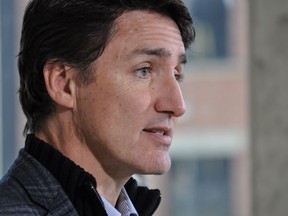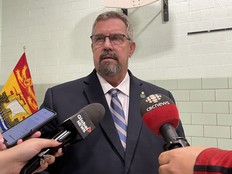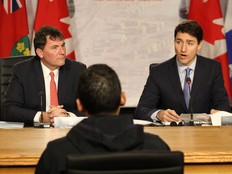Duncan Dee: Trudeau, federal government to blame for broken system
Canadians must hold PM, feds accountable for immigration mess

Article content
“In 2017, two per cent of our population were temporary immigrants. That is, temporary workers or foreign students. Right now, it’s seven and a half [per cent] of our population. That has caused millions of people here in this country putting pressure on a system beyond our regular immigration levels. That has put pressure on housing, that has put pressure on the system in all ways.”
Anyone hearing these words might have thought they were comments made by an opposition Member of Parliament. After all, no one would be the least bit surprised the opposition would criticize the country’s immigration system. But they would be wrong. Those words came from none other than Prime Minister Justin Trudeau during in an interview with Matt Galloway on CBC Radio on April 4.
It would appear after nearly nine years in office, Trudeau and several members of his cabinet, including Immigration Minister Marc Miller, have suddenly realized the federal government’s own immigration system is not only broken, it is actively creating tremendous hardship in the daily lives of Canadians.
On March 27, Statistics Canada reported that as of January this year, Canada’s population had reached 40,769,890, up by nearly 1.3 million in just one year. That represents a 3.2 per cent increase, the highest rate of population growth since 1957. Over 800,000 or 63 per cent of that growth came just from temporary residents including temporary foreign workers and international students. Just a little over two per cent came from natural growth and the rest were permanent residents.
Just like the population as a whole, temporary foreign workers and students require places to live and, if and when they fall ill, a health-care system to take care of them. Yet, according to a recent nationwide survey conducted by OurCare, 6.5 million Canadians, representing 22 per cent of Canada’s adult population, lack access to a family doctor or other primary health care provider. Meanwhile, 60 per cent of those Canadians who do have a primary care provider are unable to obtain a same or next day appointment when they need one. Adding over a million new residents waiting for a family doctor is clearly unhelpful.
In more bad news, the Canadian Mortgage and Housing Corporation (CMHC) last week reported it is “expecting lower housing starts in 2024” and that “new construction in 2025-2026 won’t reach 2021-2023 levels.”
Any prime minister, cabinet minister or senior public servant would have easy access to these figures. Canadians should be able to expect their leaders to consider this data before making consequential decisions impacting the lives of Canadians.
But Trudeau and his immigration minister would have Canadians believe both the huge numbers of new residents and the sorry state of Canada’s health-care system and housing supply come as total surprises. That when they decided to issue visas to more than 800,000 temporary residents in a single year, they did so without first assessing the impact such large numbers of new arrivals over such a short period of time would have on housing and health care.
In response to questions during his interview, the Trudeau said: “aggressive action on temporary, on international students was something we had to do because provinces and institutions had exploded the numbers so rapidly that the federal government had to say, no, we’re going to limit the number of international students because it’s putting too many pressures on neighbourhoods around.”
But provincial governments and post-secondary institutions aren’t the ones issuing the visas. That’s the exclusive role of the federal government. In fact, before he became prime minister, Trudeau was well aware of the federal government’s role in managing Canada’s immigration system.
In a remarkably prescient opinion piece published by the Toronto Star in 2014, Trudeau wrote: “Since taking office, Prime Minister Stephen Harper and the Conservative Party have transformed the Temporary Foreign Worker Program — which was originally designed to bring in temporary workers on a limited basis when no Canadian could be found — into one that has brought in a large pool of vulnerable workers. As a result, the number of short-term foreign workers in Canada has more than doubled, from 141,000 in 2005 to 338,000 in 2012. There were nearly as many temporary foreign workers admitted into the country in 2012 as there were permanent residents — 213,573 of the former compared to 257,887.”
“At this rate, by 2015, temporary worker entries will outnumber permanent resident entries.”
One can only wonder what the Justin Trudeau of 2014 would have to say about the Justin Trudeau of 2024. Not only have new temporary resident arrivals exceeded those of permanent residents, the Statistics Canada figures show nearly twice as many temporary residents arrived as permanent ones. In fact, by January this year, Statistics Canada counted over 2.6 million “temporary” residents. But these categories fail to describe the reality that large numbers of so-called “temporary” residents are able to apply to stay permanently.
Trudeau’s attempts to evade responsibility for the failures of his own immigration policies by pretending to be an opposition critic or pointing fingers at provincial governments or colleges and universities will not fool Canadians. Immigration is an exclusively federal responsibility and the federal government alone issues the visas that permit new residents to enter the country. It is the prime minister and his federal government that Canadians must hold accountable for Canada’s broken immigration system.
Duncan Dee is a former chief operating officer at Air Canada and a member of the panel appointed to review the Canada Transportation Act in 2016. A Brunswick News columnist, he resides in Grand-Barachois.












Postmedia is committed to maintaining a lively but civil forum for discussion. Please keep comments relevant and respectful. Comments may take up to an hour to appear on the site. You will receive an email if there is a reply to your comment, an update to a thread you follow or if a user you follow comments. Visit our Community Guidelines for more information.